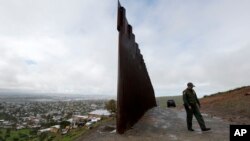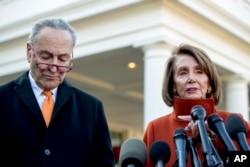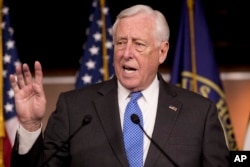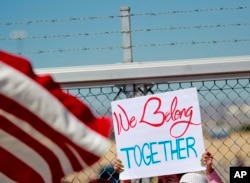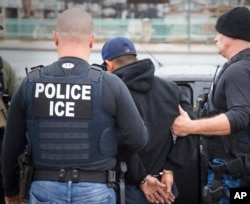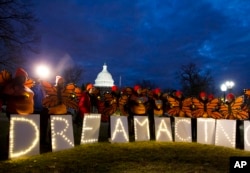President Donald Trump and congressional Republicans have blasted Democrats for going easy on immigration enforcement — allegations that only intensified throughout the contentious 35-day government shutdown earlier this year triggered by a dispute over Trump's demand for billions of dollars in funding for a U.S.-Mexico border wall.
Immigration and border security controversies festered throughout the 2018 midterm election as the Democrats regained control of the House of Representatives. The issues are certain to dominate the debate in the coming months as Democratic candidates position themselves to challenge Trump in the 2020 presidential campaign.
Trump has leveled in numerous tweets and public statements that Democrats are for open borders and lax enforcement of immigration laws that allow the free flow of illegal immigrants, human trafficking and drugs into the country.
"It is outrageous what the Democrats are doing to our country!" Trump tweeted last October, along with a video depicting undocumented immigrants accused of murder.
The president and members of his administration have also claimed Democrats were for a border wall in 2006 but are "now playing politics just because Donald Trump is in office," as White House Chief of Staff Mick Mulvaney asserts. The claim is only partially true.
In 2006, then-Senators Barack Obama, Chuck Schumer and Hillary Clinton voted to fund 700 miles of fencing along the southern border, but not the more ambitious towering, concrete wall paid for by Mexico that Trump frequently touted.
House Speaker Nancy Pelosi, a California Democrat, and Senate Minority Leader Chuck Schumer of New York argue that Trump has manufactured a crisis at the border to justify his recent emergency declaration to redirect defense funds to build a wall. They say that his attacks ignore the Democrats' willingness to forge a sensible, balanced approach to border security and related immigration reforms to try to stem the flow of hundreds of thousands of illegal immigrants annually.
"We all agree we need to secure our borders while honoring our values," Pelosi said during the government shutdown.
A review of the Democrats' stands on border security and immigration suggests the party has been heavy on rhetoric and relatively light on details for coping with border security challenges and preventing illegal border crossings by families with young children. There is also little unanimity on how to detain families with young children and how to reunite thousands of young children with their parents after being separated at the border.
Here is where Democrats currently stand on the record on four key areas of immigration policy.
Border security
While options for dealing with legal and undocumented immigrants are varied within the Democrats caucus, the entire party is united in the belief that the situation at the border is not the crisis described by Trump.
The first sentence of the Democratic Party platform states that members "are fighting for every immigrant who feels threatened by Donald Trump's election." But the rest of the statement is short on details, noting Democrats want change that "fixes our nation's broken immigration system" and "improves border security."
Pelosi, the de facto leader of the party until a 2020 presidential nominee is named, has said Democrats "will meet our responsibility to provide strong, smart border security that serves our country's needs, is consistent with our values and doesn't squander billions of dollars on a border wall."
House Majority Leader Steny Hoyer of Maryland expanded on those priorities in January, while calling on Republicans to reopen the federal government to allow both parties the opportunity to negotiate on immigration reform. Asked if Democrats opposed to a wall would support fencing or other physical barriers, Hoyer told reporters, "We've put forward a number of very important alternatives and substantial sums of money, in the billions of dollars to make sure that our borders are secure."
The Democrats' alternative, passed by the House on Jan. 3, included $1.3 billion for border fencing, $366.5 million for border security technology and $224 million for equipment at ports of entry.
Doris Meissner, a senior fellow at the Migration Policy Institute and a former commissioner of U.S. Immigration and Naturalization Services under the Clinton administration, told VOA the nation's highly politicized immigration discussion obscures the "bipartisan success" gained by lawmakers focusing on border security in the years following the Sept. 11, 2001 terrorist attacks. She noted Democrats and Republicans have worked together on the issue for years, telling VOA, "There's been broad consensus on building up border security resources."
Family separation
Trump's ill-fated "zero tolerance" policy by which the government tried to criminally prosecute all parents who were arrested trying to illegally cross into the U.S. resulted in the separation of at least 2,700 children from their parents, according to a preliminary government count. But a report subsequently issued by the inspector general for the Department of Health and Human Services said thousands more migrant children likely were separated from their parents before the Trump administration ended the policy last year.
"This is not an immigration issue, this is a humanitarian issue," Pelosi said last summer of the Trump administration's policy of separating children from families at the U.S.-Mexico border. Democrats have put forward the Keep Families Together Act, a bill which enjoys near-unanimous support in the congressional Democratic caucus. If passed, the act would separate families only if a court or agency decided removal from the immigrant parent was in the best interests of the child.
This is in keeping with the Congressional Progressive Caucus, a left-leaning group within the House. It also reflects the views of some of the presidential candidates, including Senators Bernie Sanders of Vermont, Elizabeth Warren of Massachusetts and Kamala Harris of California.
The caucus has specifically outlined solutions to what they call a humanitarian crisis at the border involving unaccompanied minor children. Noting that none of the solutions require "increased border militarization," the caucus emphasizes community-based care and culturally sensitive treatments for the children as well as an end to the implementation of restrictive policies requiring proof of legal status prior to family reunification.
Abolish ICE
"There's a debate within the Democratic party on where the party stands on immigration enforcement," Meissner said.
There are some among the Democratic caucus who would like to see the Immigration and Customs Enforcement (ICE) abolished. A group of progressive Democrats introduced a proposal last summer that would have eliminated ICE and instead set up a commission "with a human immigration system that upholds the dignity of all individuals." But the proposals failed to gain traction when many within the party acknowledged it wasn't practical and that some government entity needed to perform ICE's responsibilities.
"Abolish ICE is a simple statement that is a counterpart to 'Build the Wall.' You see now these very simplistic rallying cry calls on both sides of the spectrum," Meissner said.
But the January 2019 budget passed by the Democratic majority in the House included funding to hire 328 additional U.S. Customs and Border Protection officers as well as more than $7 billion for ICE.
Most Democrats are closer to Pelosi's position, released through a spokesperson last summer, who said she "believes that ICE has been on the wrong end of far too many inhumane and unconstitutional practices to be allowed to continue without an immediate and fundamental overhaul."
DACA and TPS
The most likely area for Democratic action on immigration will be on a smaller group of immigrants impacted by Trump administration policies in attempting to undermine two Obama-era programs.
One is the Deferred Action for Childhood Arrivals (DACA) that grants temporary legal status to about 3.2 million "Dreamers" who were brought to the country as children by illegal immigrants. Before Trump sought to cancel DACA, Dreamers who applied for the program were granted renewable two-year periods of deferred action from deportation and were made eligible for work permits or to attend school. The fate of the program is currently tied up in the courts.
The other program provides Temporary Protected Status (TPS) for more than 300,000 individuals who fled to the U.S. from armed conflict or natural disasters in their countries, including Haiti, El Salvador, Honduras and Yemen. But their immigration status is now in limbo as Trump sought to end the program.
Hoyer told reporters in late January that he expects to bring a bill addressing DACA and TPS to the House floor for a vote in the "near future." That vote could be politically beneficial for Democrats as the nation's focus shifts away from Capitol Hill and toward the crowded field of Democratic candidates for the 2020 presidential nomination. Almost three-quarters of Americans support "granting permanent legal status to immigrants brought to the U.S. illegally when they were children," according to a 2018 Pew Research poll.
The Congressional Hispanic Caucus has urged Pelosi to take action to address the status of the 3.2 million Dreamers and the more than 300,000 individuals whose immigration status is in limbo after the administration ended the Temporary Protected Status (TPS) for most holders.
A pathway to citizenship for all undocumented immigrants has been gaining public support. A 2017 CNN/ORC poll found 13 percent of the public supported deporting immigrants already in the U.S. illegally. Sixty percent of the public said the government should develop a plan allowing undocumented immigrants working in the United States to become legal residents.
But with a high-stakes presidential election looming and Republicans still in control of the U.S. Senate, Democrats' attempts to advance immigration reform legislation will likely be limited.




